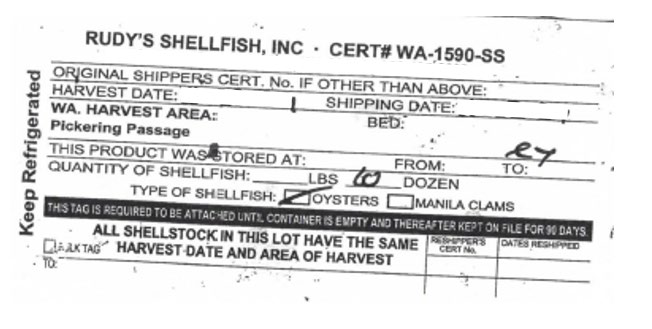FDA Advises Restaurants and Retailers Not to Serve or Sell and Consumers Not to Eat Certain Oysters and Manila Clams from Pickering Passage, Washington Potentially Contaminated with Norovirus
Audience
- Restaurants and food retailers in Arizona (AZ), California (CA), Florida (FL), Massachusetts (MA), Michigan (MI), New York (NY), and Washington (WA) that have recently purchased oysters or Manila clams harvested from 11/15/2024 to 12/11/2024 by Rudy’s Shellfish (WA-1590-SS) from the Pickering Passage growing area in Washington.
- Consumers in AZ, CA, FL, MA, MI, NY, and WA who have recently purchased oysters or Manila clams harvested from 11/15/2024 to 12/11/2024 by Rudy’s Shellfish (WA-1590-SS) from the Pickering Passage growing area in Washington.
Product
The implicated products include oysters and Manila clams harvested from 11/15/2024 to 12/11/2024 by Rudy’s Shellfish (WA-1590-SS) from the Pickering Passage growing area in Washington.
The following photo is included as an example shellfish tag that would be attached to containers for reference. The Harvest Date field would include the specific dates identified in the recall information, as mentioned above.
Purpose
Washington has recalled oysters and Manila clams harvested from 11/15/2024 to 12/11/2024 by Rudy’s Shellfish (WA-1590-SS) from the Pickering Passage growing area in Washington due to a Norovirus outbreak. The FDA is advising restaurants and food retailers not to serve or sell and to dispose of the oysters and Manila clams harvested from 11/15/2024 to 12/11/2024 by Rudy’s Shellfish (WA-1590-SS) from Pickering Passage growing area in Washington because they may be contaminated with Norovirus.
Oysters and clams contaminated with norovirus can cause illness if eaten, and potentially severe illness in people with compromised immune systems. Food containing norovirus may look, smell, and taste normal. Consumers of these products who are experiencing symptoms of illness should contact their healthcare provider and report their symptoms to their local Health Department. Diarrhea, abdominal cramps, nausea, vomiting, and fever may be associated with gastroenteritis infections caused by this organism.
Symptoms of Norovirus
People of all ages can get infected and sick with norovirus. The most common symptoms of norovirus are diarrhea, vomiting, nausea, and stomach pain. Other symptoms include fever, headache, and body ache.
A person usually develops symptoms 12 to 48 hours after being exposed to norovirus. Most people with norovirus illness get better within 1 to 3 days.
If you have norovirus illness, you can feel extremely ill, and vomit or have diarrhea many times a day. This can lead to dehydration, especially in young children, older adults, and people with other illnesses. Symptoms of dehydration include decrease in urination, dry mouth and throat, and feeling dizzy when standing up. Children who are dehydrated may cry with few or no tears and be unusually sleepy or fussy.
If you think you or someone you are caring for is severely dehydrated, call your healthcare provider.
Summary of Problem and Scope
On 12/12/2024, Washington advised the FDA of a recallExternal Link Disclaimer of oysters and Manila clams harvested from 11/15/2024 to 12/11/2024 by Rudy’s Shellfish (WA-1590-SS) from the Pickering Passage growing area in Washington due to possible norovirus contamination. The oysters and Manila clams were shipped to distributors and retailers in AZ, CA, FL, MA, MI, NY, and WA and may have been distributed to other states, as well.
FDA Actions
The FDA is issuing this alert advising restaurants and food retailers not to serve or sell and consumers not to eat oysters and Manila clams harvested from 11/15/2024 to 12/11/2024 by Rudy’s Shellfish (WA-1590-SS) from the Pickering Passage growing area in Washington due to possible norovirus contamination. The FDA is awaiting further information on distribution of these oysters and Manila clams and will continue to monitor the investigation and provide assistance to state authorities as needed. As new information becomes available, the FDA will update the safety alert.
Recommendations for Restaurants and Retailers
Restaurants and retailers should not serve or sell these potentially contaminated oysters and Manila clams. Restaurants and retailers should dispose of any products by throwing them in the garbage or returning them to their distributor for destruction.
Restaurants and retailers should also be aware that shellfish may be a source of pathogens and should control the potential for cross-contamination of food processing equipment and the food processing environment. They should follow the steps below:
- Wash hands with warm water and soap following the cleaning and sanitation process.
- Retailers, restaurants, and other food service operators who have processed and packaged any potentially contaminated products need to be concerned about cross-contamination of cutting surfaces and utensils through contact with the potentially contaminated products.
- Retailers that have sold bulk product should clean and sanitize the containers used to hold the product.
- Regular frequent cleaning and sanitizing of food contact surfaces and utensils used in food preparation may help to minimize the likelihood of cross-contamination.
Recommendations for Consumers
Consumers should not eat these potentially contaminated oysters and Manila clams.
Who to Contact
Consumers who have symptoms should contact their health care provider to report their symptoms and receive care.
To report a complaint or adverse event (illness or serious allergic reaction),
visit Industry and Consumer Assistance.
Follow us on XExternal Link Disclaimer (formerly Twitter)

